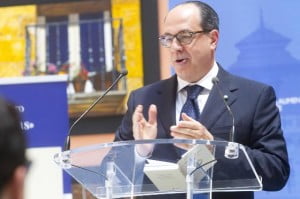 Paolo De Castro, chair of the Committee on Agriculture and Rural Development of the European Parliament doesn’t want to wast time. During the Informal Agriculture and Fisheries Council he met Cyprus’ Minister for Agriculture, Natural Resources and Environment, Sofoclis Aletraris and Dacian Cioloş, Commissioner responsible for agriculture and rural development, for an informal trialogue to start the negotiation on the Common Agricultural Policy.
Paolo De Castro, chair of the Committee on Agriculture and Rural Development of the European Parliament doesn’t want to wast time. During the Informal Agriculture and Fisheries Council he met Cyprus’ Minister for Agriculture, Natural Resources and Environment, Sofoclis Aletraris and Dacian Cioloş, Commissioner responsible for agriculture and rural development, for an informal trialogue to start the negotiation on the Common Agricultural Policy.
The debate on the Cap reforms gets in full swing
“The Commission’s proposals for a reform of the CAP is 650 pages. There are 7.456 amendments to the text: a record in EP history. This is a sign that Meps want to deeply change it”.
Will it be a long and difficult discussion?
“Probably. But fortunately The Council of the European union chose to use our negotiation platform and this will help”.
Which are the main differences between the two institutions?
“We both criticize the Commission’s proposal but the Parliament wants to start from it while the Council wants to change it completely”.
What is your main critic to this proposal?
“The reform is too rigid. We fear that the proposal could lead to more bureaucracy, which would be an additional burden for EU farmers. More controls create more red tape, it’s obvious. Cioloş admits that there will be a 15% increase in costs for farmers. We believe it could be even more, around 30%”.
Which will be the main changes?
“First we are working to cut unnecessary bureaucracy and simplify existing rules. Second there will be more flexibility, with 27 member states and 27 types of agriculture from Cyprus to Sweden it’s not possible to apply the rules in the same way. And third there will be more measure to face the market crisis. We offer insurance and we want to push producers to organize themselves, to come together to better manage the difficulties”.
Farmers critic the proposal of setting 7% of farmed land aside for ecological purpose
“The percentage is too high, especially if applied to little lands. There is no ecological use to land aside just hundred square meters for instance. But it could be a problem for a family of farmers. We could think to apply the rule just to macro-areas. If we unite lands of different companies it could be useful, we could create ecological corridors impacting on the environment but not too much on the economy”.



![Un motoscafo in Svezia. Nell'Ue si pone un problema di mancato riconoscimento delle patenti nautiche [foto:
Matti Blume, Wikipedia Commons. Copyright: Creative Commons Attribution-Share Alike]](https://www.eunews.it/wp-content/uploads/2024/11/motoscafo-Saltsjoen_Stockholm_P1090679-350x250.jpg)






![Un motoscafo in Svezia. Nell'Ue si pone un problema di mancato riconoscimento delle patenti nautiche [foto:
Matti Blume, Wikipedia Commons. Copyright: Creative Commons Attribution-Share Alike]](https://www.eunews.it/wp-content/uploads/2024/11/motoscafo-Saltsjoen_Stockholm_P1090679-120x86.jpg)